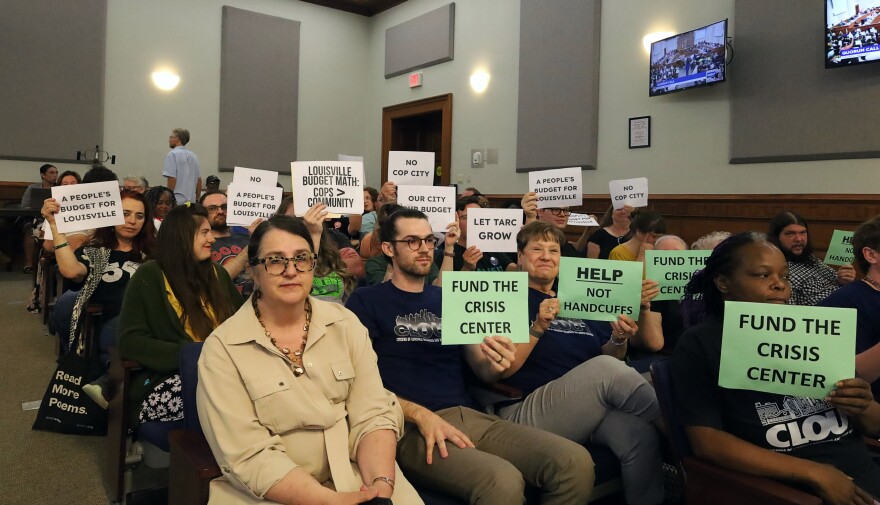Louisville Metro will have a $1.2 billion budget in the coming fiscal year, about 8% larger than this year.
The new spending plan is buoyed mostly by higher-than-expected tax revenues leading to a $50 million surplus. The 2026 budget, which goes into effect July 1, includes new funding for 24/7 shelter beds for people experiencing homelessness and a roughly $25 million increase to the Louisville Metro Police Department’s budget. It will also fund pilot programs, proposed by Mayor Craig Greenberg, to build new manufactured homes across Jefferson County and put drones in the hands of first responders.
Council members approved next year’s budget 21-4 during a meeting Thursday night.
District 11 Council Member Kevin Kramer, a Republican who chairs the Budget Committee, said ahead of the vote that he believed the final budget captured “the desires, the priorities” of city leaders.
“I feel sure that most of us would acknowledge that if we wrote the budget, this is not what it would look like, but that’s the way budgets are when you have 26 council members who are trying to figure out what their priorities are,” Kramer said.
Metro Council has spent the last two months vetting and debating details of the budget put together by Greenberg’s administration.

Republicans, who have one fewer seat than Democrats on the council, pushed to fund the land acquisition for a first responder training center in the capital budget. Located somewhere in southwest Jefferson County, the training center is expected to be used by LMPD, Louisville Fire and Metro Emergency Medical Services.
Council added in $6 million for the facility without raising borrowing. That means they needed to make cuts elsewhere in the capital budget. The council zeroed out a $3 million line item for a new public transit hub in downtown Louisville. And they reduced Greenberg’s proposed $15 million contribution to the Affordable Housing Trust Fund to $12.5 million.
Right before the final vote Thursday night, District 6 Democrat J.P. Lyninger put forward a sweeping set of amendments aimed at reversing some of those cuts. His proposal, which he called a “people’s budget,” would have kept LMPD’s budget flat and significantly increased funding for TARC.
“[This] makes changes to the proposed Louisville Metro budget that meets the needs for working class Louisvillians,” he said. “This is a package of amendments that would help protect access to public transit, expand access to food and lower the price of groceries and fund a study to research bringing LG&E to public ownership.”
Lyninger argued that his amendments would not impact any individual Metro Council district or neighborhood.
Republicans, however, felt Lyninger’s proposed cuts to LMPD and the exclusion of the first responder training center would hurt suburban areas.
District 19's Anthony Piagentini, who heads the Republican Caucus, voted against the amendment.
“The police budget goes up every year largely because of salaries,” he said. “These are negotiated salaries in contracts for rank-and-file police officers that have to support their families and be properly compensated for the work they do every day.”
Piagentini argued that not budgeting for increased officer salaries would force the city to cut police officers or new recruit classes and would essentially “defund the police.”
Council members rejected Lyninger’s amendments in a 21-4 vote, with Republicans unanimously opposed.
What’s new for 2026?
The budget will provide additional funding to a number of deferred maintenance projects in public parks. The overall budget for Parks and Recreation will increase by about $2.7 million.
Some of the funded projects include:
- $110,000 for improvements at the Valley Station baseball field
- $10,000 to the Shawnee Youth Center
- $50,000 for a splash pad in Shively
- $75,000 for the Louisville Youth Football League
- And $14,200 for the Parkland Community Garden
There is also $300,000 for the new park ranger program. Louisville piloted the park ranger program in Iroquois Park in 2023 and Greenberg announced last year that he intended to make it permanent to increase safety in parks.
While funding for the Affordable Housing Trust Fund dropped year-over-year, there is new funding for homelessness and housing elsewhere in the budget. Greenberg proposed an additional $1 million to expand 24/7 shelter programs at St. Vincent De Paul and the Neighborhood Place, and Metro Council added funding into the budget for Dare to Care and the Arthur Street Hotel.
Following Metro Council’s approval Thursday night, Greenberg said in a statement that he supported the council’s changes and felt like the final budget will speed up the city’s progress.
“It strengthens our historic investments in public safety, parks, libraries, first responders, infrastructure, job creation, affordable housing, homeless services and keeping our city clean,” he said. “We have incredible momentum, and we continue moving forward in a new direction.”
There are few cuts to programs or services in the 2026 budget.
Brightside, an organization that organizes county-wide cleanups and beautification projects, lost one full-time position due to a budget cut. Greenberg had proposed eliminating funding for Louisville’s Sister Cities program, but Metro Council added that funding back in.






